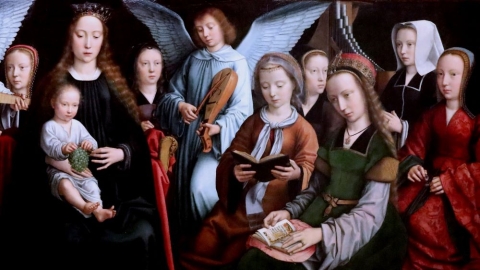The Mother of God Shared in the Passion of Christ

After having considered the grace of the divine maternity in relation to God and to Christ, who showed us the greatness of the Mother of God; then this same grace in the Holy Virgin spread through her immaculate conception, filled it with the plenitude of which she was filled, manifested it by her perpetual virginity, and finally was fulfilled in her Assumption. What remains is to consider this grace in relation to us.
St. Thomas remarks that similitude is the cause of love. When beings resemble each other, a mutual benevolence is established, so that each one sees what happens to the other as happening to himself. Hence the terms “sympathy” and “compassion.”
This compassion is measured according to different criteria
-- Through the union that is the foundation of compassion, we cannot be more united to Jesus Christ than Mary was.
This is why Our Lady’s compassion must be called sorrowful rather than merciful; mercy looks at the misery of others, while sorrow understands the evil done as to oneself. This can be seen in three orders.
*In the natural order because she is His Mother. And that she alone gave Him His humanity, which means that they have a unique physical resemblance.
*In the supernatural order, since Mary has an abundance of grace and charity superior to that of any other saint.
*Lastly, in the order of the hypostatic union, because she is the Mother of God.
-- Through the gravity of the evil suffered:
*The principal evil that is the suffering of Jesus.
*The causes which are the sins of men, the blindness of the Jews, the scandal of the disciples, and the loss of souls.
--Through the disposition of the one who sympathizes:
*This depends on the perfection of the knowledge of the evil endured: the Virgin has a clearly defined knowledge of this evil; she possesses a perfect sensibility on which spiritual pain is reflected, and which is overwhelmed by the sight of Jesus’ physical sufferings.
*She also depends on the perfection of charity, the love of God and especially of her Son, wounded by sin and by the injustice inflicted on Him.
*Finally, by the absence of respite: no consolation came to diminish her sorrow.
The Mother of God has thus shared in the Passion of Jesus, and her sorrow was the greatest after that of Jesus Himself.
Reasons of suitability
The Mother of God was endowed with eminent privileges in view of the merits of Jesus Christ. Now the economy of the Redemption desires that we be configured to the Passion of Christ so as to profit from its effects. Mary’s sorrow is the measure of her participation in the fruits of the Redemption. However, it does not serve as penal suffering—as a chastisement—since the Virgin had not sinned.
Mary must also endure the sufferings that the Savior lacks, according to the words of St. Paul: some are incompatible with Jesus’ privileges, like the anguish of complete uncertainty as to the outcome of events. And compassion itself, i.e., the resonance of the suffering of one person on another, could not be done by Jesus alone. For these sorrows, the Blessed Virgin was needed.
It is through this immense sorrow that the Mother of God merited the title of Queen of the Martyrs.
Related links
Illustration : Flickr / Jean Louis Mazieres (CC BY-NC-SA 2.0)





